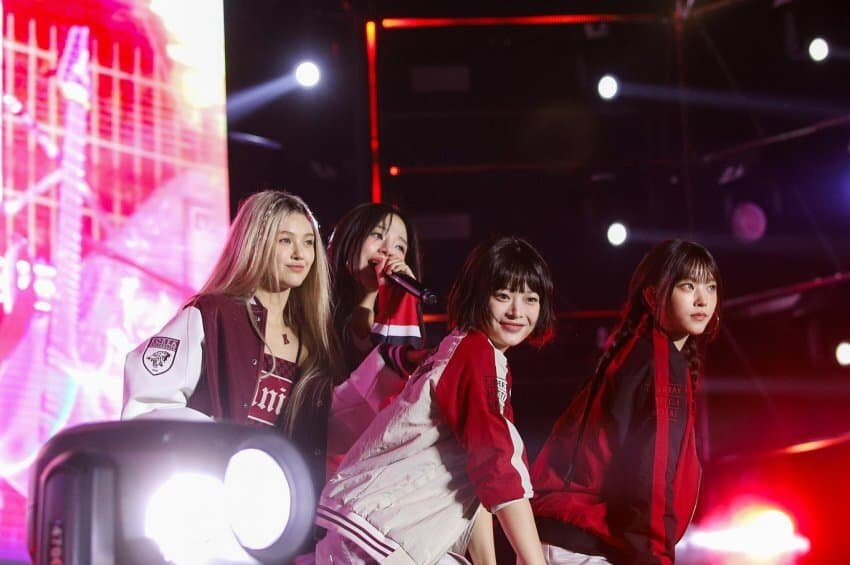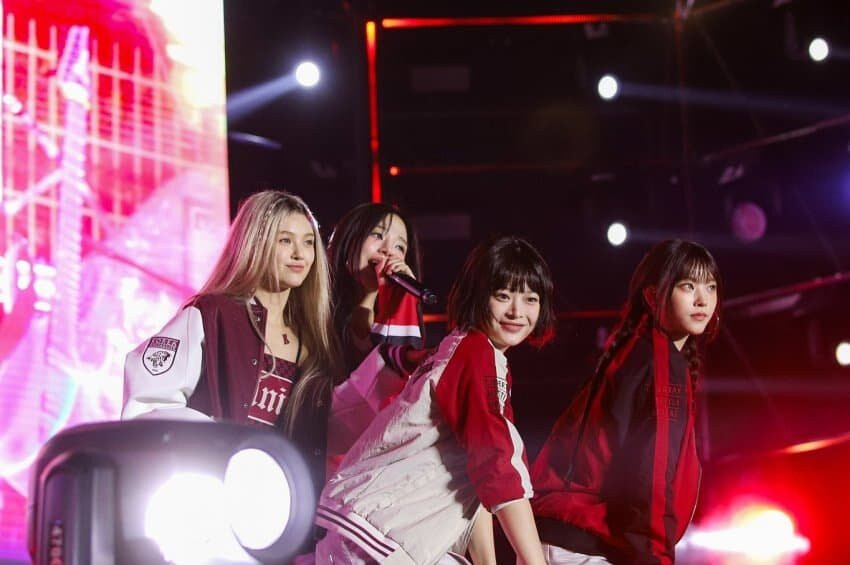Courtesy of Korea University's Instagram account
Every May and June, universities across South Korea host multi-day campus festivals featuring events such as sports games, club performances, and K-pop concerts. Recent years have seen schools competing to book prominent K-pop bands, drawing not only students and alumni but also many external K-pop fans and concertgoers.
This year, Yonsei University's festival, Akaraka, running from May 28 to May 31, features acts like Ateez, Ive, Itzy, and Riize. Korea University's Ipselenti festival, held from May 21 to May 23, included performances by NewJeans, Illit, and Nmixx.
Ticket sales and alumni donations fund these concerts. Tickets for these events are significantly cheaper than typical K-pop concert tickets, with Akaraka and Ipselenti charging 17,000 won ($12.5) and 18,500 won ($13.6), respectively. However, some students have resold their tickets online at significantly higher prices, reaching hundreds of thousands of won, causing discontent among students who failed to secure tickets.
 |
| ▲ NewJeans performs at Korea University's festival held in Seoul, May 26 / Courtesy of Korea University's Instagram |
A Yonsei University graduate, Park Ji-ho, criticized the ticket reselling practice, noting an influx of K-pop fans over students at the festival. Former Korea University student, Kim Kyung-ho, expressed concern about the festival's shift from traditional student activities to major K-pop concerts.
Yonsei University stated that their cheerleading team manages the concerts and the school is not involved. In response to complaints, the cheerleading team switched to mobile tickets that cannot be screen-captured. Despite this, many tickets had already been sold. The team also offered new ticket opportunities to those who reported illegal ticket sales.
Korea University implemented unique ticket numbers to track scalping. Other universities, like Kyung Hee University and Hanyang University, require student IDs to prevent outsider attendance. Konkuk University issued bracelets and checked multiple forms of identification to control access to their festival.
Sayart
Blue YIM, yimyoungseo1010@naver.com
Students Resell Campus Festival Tickets at Exorbitant Prices
Courtesy of Korea University's Instagram account
Every May and June, universities across South Korea host multi-day campus festivals featuring events such as sports games, club performances, and K-pop concerts. Recent years have seen schools competing to book prominent K-pop bands, drawing not only students and alumni but also many external K-pop fans and concertgoers.
This year, Yonsei University's festival, Akaraka, running from May 28 to May 31, features acts like Ateez, Ive, Itzy, and Riize. Korea University's Ipselenti festival, held from May 21 to May 23, included performances by NewJeans, Illit, and Nmixx.
Ticket sales and alumni donations fund these concerts. Tickets for these events are significantly cheaper than typical K-pop concert tickets, with Akaraka and Ipselenti charging 17,000 won ($12.5) and 18,500 won ($13.6), respectively. However, some students have resold their tickets online at significantly higher prices, reaching hundreds of thousands of won, causing discontent among students who failed to secure tickets.
 |
| ▲ NewJeans performs at Korea University's festival held in Seoul, May 26 / Courtesy of Korea University's Instagram |
A Yonsei University graduate, Park Ji-ho, criticized the ticket reselling practice, noting an influx of K-pop fans over students at the festival. Former Korea University student, Kim Kyung-ho, expressed concern about the festival's shift from traditional student activities to major K-pop concerts.
Yonsei University stated that their cheerleading team manages the concerts and the school is not involved. In response to complaints, the cheerleading team switched to mobile tickets that cannot be screen-captured. Despite this, many tickets had already been sold. The team also offered new ticket opportunities to those who reported illegal ticket sales.
Korea University implemented unique ticket numbers to track scalping. Other universities, like Kyung Hee University and Hanyang University, require student IDs to prevent outsider attendance. Konkuk University issued bracelets and checked multiple forms of identification to control access to their festival.
Sayart
Blue YIM, yimyoungseo1010@naver.com
Related articles
- Seventeen Celebrates Ninth Anniversary with UNESCO Donation
- "The Player 2: Master of Swindlers" Set to Premiere on tvN
- Babymonster's "Sheesh" Surpasses 100 Million Spotify Plays
- Billlie Announces First European Tour
















